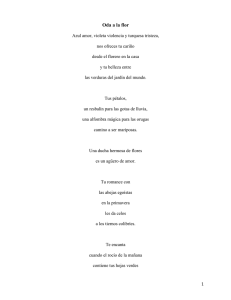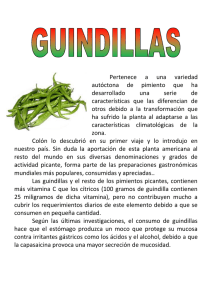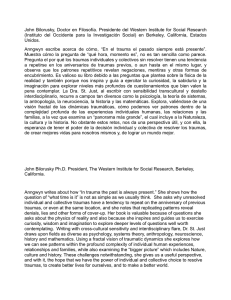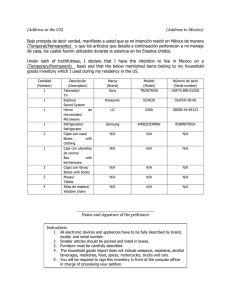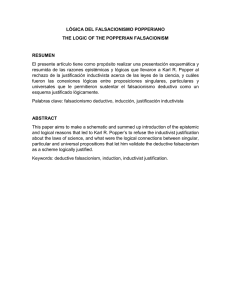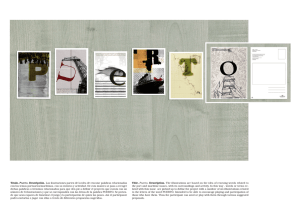Dental Health
Anuncio
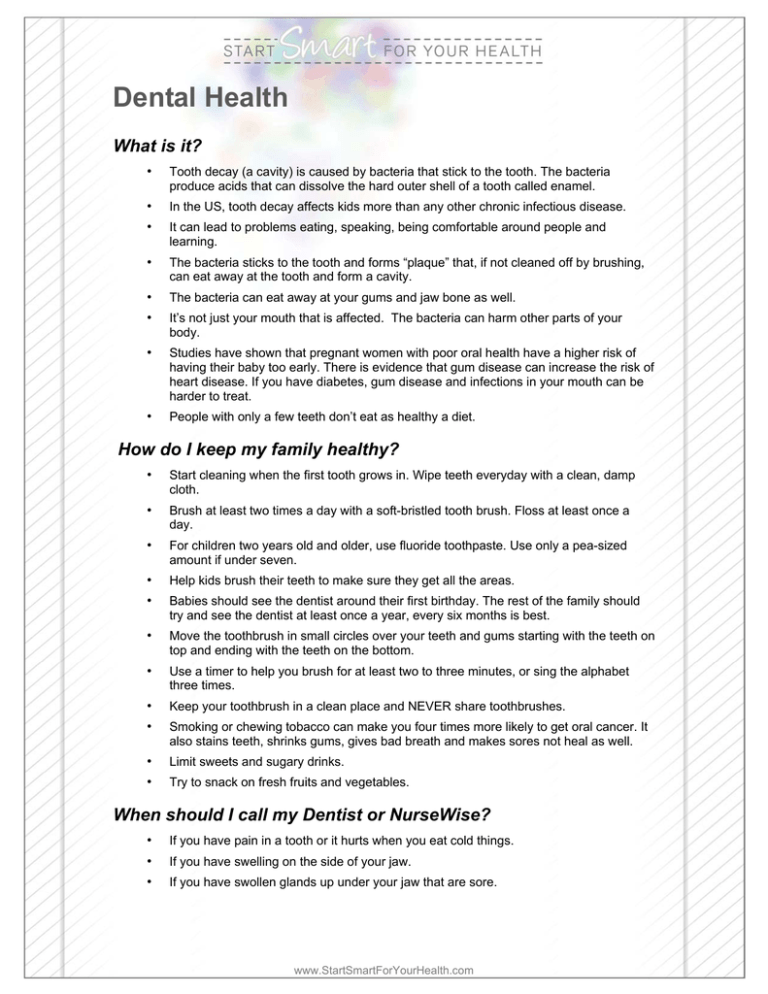
Dental Health What is it? • Tooth decay (a cavity) is caused by bacteria that stick to the tooth. The bacteria produce acids that can dissolve the hard outer shell of a tooth called enamel. • • In the US, tooth decay affects kids more than any other chronic infectious disease. • The bacteria sticks to the tooth and forms “plaque” that, if not cleaned off by brushing, can eat away at the tooth and form a cavity. • The bacteria can eat away at your gums and jaw bone as well. • It’s not just your mouth that is affected. The bacteria can harm other parts of your body. • Studies have shown that pregnant women with poor oral health have a higher risk of having their baby too early. There is evidence that gum disease can increase the risk of heart disease. If you have diabetes, gum disease and infections in your mouth can be harder to treat. • People with only a few teeth don’t eat as healthy a diet. It can lead to problems eating, speaking, being comfortable around people and learning. How do I keep my family healthy? • Start cleaning when the first tooth grows in. Wipe teeth everyday with a clean, damp cloth. • Brush at least two times a day with a soft-bristled tooth brush. Floss at least once a day. • For children two years old and older, use fluoride toothpaste. Use only a pea-sized amount if under seven. • • Help kids brush their teeth to make sure they get all the areas. • Move the toothbrush in small circles over your teeth and gums starting with the teeth on top and ending with the teeth on the bottom. • Use a timer to help you brush for at least two to three minutes, or sing the alphabet three times. • Keep your toothbrush in a clean place and NEVER share toothbrushes. • Smoking or chewing tobacco can make you four times more likely to get oral cancer. It also stains teeth, shrinks gums, gives bad breath and makes sores not heal as well. • • Limit sweets and sugary drinks. Babies should see the dentist around their first birthday. The rest of the family should try and see the dentist at least once a year, every six months is best. Try to snack on fresh fruits and vegetables. When should I call my Dentist or NurseWise? • • • If you have pain in a tooth or it hurts when you eat cold things. If you have swelling on the side of your jaw. If you have swollen glands up under your jaw that are sore. www.StartSmartForYourHealth.com • • • If a tooth cracks or gets knocked out. If you find a new sore or colored area in your mouth or tongue. If you have really bad breath, even after brushing well. www.StartSmartForYourHealth.com Salud dental ¿Qué es? • Las caries dentales (picaduras) las causan bacterias que se pegan al diente. Las bacterias producen ácidos que pueden disolver la cubierta dura externa del diente, llamada esmalte. • En EE.UU., las caries dentales afectan más a los niños que cualquier otra enfermedad infecciosa crónica. • Puede causar problemas para comer, hablar, estar cómodo alrededor de otras personas y aprender. • Las bacterias se pegan al diente y forman “sarro” que, si no se limpia con el cepillado, puede carcomer el diente y formar una picadura. • • Las bacterias pueden carcomer también las encías y el hueso de la mandíbula. • Los estudios han mostrado que las mujeres embarazadas que tienen mala salud oral tienen un mayor riesgo de que su bebé nazca demasiado prematuro. Hay evidencia de que la enfermedad de las encías puede aumentar el riesgo de enfermedad cardiaca. Si tiene diabetes, la enfermedad de las encías y las infecciones de la boca pueden ser más difíciles de tratar. • Las personas que sólo tienen unos cuantos dientes no consumen una dieta muy sana. No sólo afecta su boca. Las bacterias pueden dañar otras partes de su cuerpo. ¿Cómo mantengo sana a mi familia? • Comience a limpiarles los dientes cuando aparezca el primer diente. Limpie los dientes todos los días con un paño limpio y húmedo. • Cepille al menos dos veces al día con un cepillo de dientes de cerdas blandas. Pase el hilo dental al menos una vez al día. • Para los niños de dos años de edad y mayores, use pasta de dientes con flúor. Use sólo una cantidad pequeña (del tamaño de una arveja) si es menor de siete años de edad. • Ayude a los niños a cepillarse los dientes para asegurarse de que cubran todas las zonas. • Los bebés deben ver al dentista alrededor de su primer cumpleaños. El resto de la familia debe tratar de ver al dentista al menos una vez al año, cada seis meses es lo mejor. • Mueva el cepillo de dientes en círculos pequeños sobre los dientes y las encías comenzando con los dientes de arriba y terminando con los de abajo. • Use un reloj para ayudarle a cepillarse durante al menos dos a tres minutos, o cante el alfabeto tres veces. • Mantenga su cepillo de dientes en un lugar limpio y NUNCA comparta los cepillos de dientes. • Fumar o masticar tabaco puede aumentar cuatro veces su probabilidad de tener cáncer oral. Además mancha los dientes, encoje las encías, da mal aliento y hace que las llagas no cicatricen tan bien. • Limite el consumo de dulces y bebidas con azúcar. www.StartSmartForYourHealth.com • Trate de consumir frutas y verduras frescas en las meriendas. ¿Cuándo debo llamar a mi dentista o a NurseWise? • • • • • Si tiene dolor en un diente o le duele cuando consume cosas frías. • Si tiene muy mal aliento, incluso después de haberse cepillado bien. Si tiene hinchazón en el costado de la mandíbula. Si las glándulas debajo de la mandíbula están hinchadas y le duelen. Si un diente se agrieta o se le cae. Si encuentra una nueva llaga o área con color en la boca o la lengua. www.StartSmartForYourHealth.com
